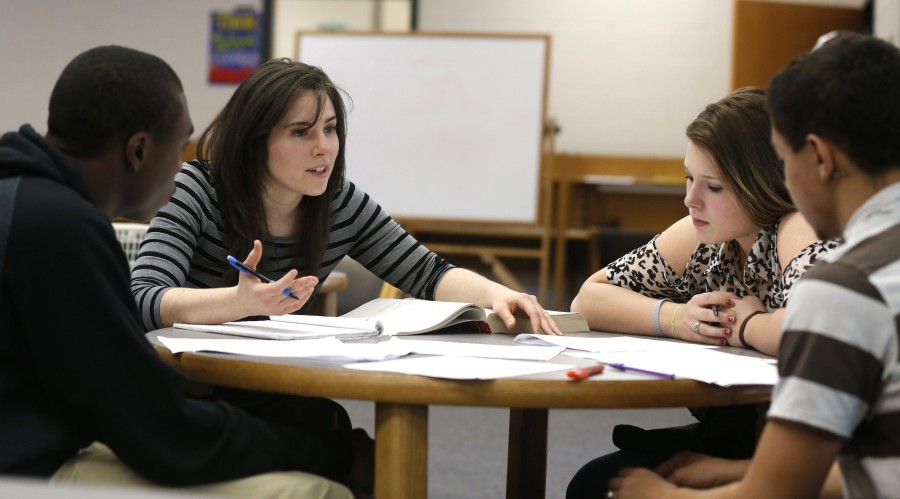Humanities’ decline: Is it really helping us?
Students prepare for their English exams. (Ethan Hyman/Raleigh News & Observer/MCT)
November 16, 2014
What exactly made Abraham Lincoln so famous? According to a new survey by College Stats, not too many people have the correct answer.
Many visitors at the Lincoln Memorial were not “able to explain his leadership and role in the American Civil War,” according to the study. “One student answered that his beard made him famous; another said he was killed at a puppet show.”
Not exactly encouraging, is it?
Sadly, it’s understandable. A study from Tufts University found that only nine states require students to pass a social studies test to graduate high school. On the other hand, although testing requirements vary by state, a significantly higher number of states require students to pass a math test to receive their high school diploma.
This all seems very unfair to me. It’s almost like schools aren’t even trying to make it look like they think social studies and math are of equal merit.
But social studies aren’t the only subject being put on the back burner. The humanities in general are becoming a lower priority in education.
The humanities are a branch of knowledge that focuses on human thoughts and experience. They include topics like English, social studies, music, and the arts. And they’re currently getting pushed to the bottom of the pyramid as technology climbs its way to the top.
In recent years, fields like math and science have assumed a greater importance in education because they are very applicable to the frequent technological innovations we face today. The idea is that our tech-savvy society only needs people who can work with the mathematical and scientific computations behind technology.
To put it simply, society is telling us that science, technology, engineering, and math (also known as STEM) are the only ways to get a job. And with the looming threat of unemployment facing college students today, students are feeling a greater push to major in STEM-related fields to increase their chances of getting a job.
Thus, most people consider it perfectly reasonable to give math and science a greater emphasis in schools.
Senior Dominica Rollins notes that Mayfield has also adopted this mindset.
“I think that Mayfield considers the STEM fields to be a higher priority,” said Rollins. “There are a variety of STEM offerings at Mayfield at many levels, but very few social studies choices.”
The humanities, while more abstract than STEM subjects, are equally important. They provide us with valuable life skills that are applicable to everything, not just technology.
Dr. Elwood Watson wrote in the May 2014 issue of Diverse, “The fact is that one does not become successful or proficient in any endeavor or any profession (and that includes STEM fields) without a good, solid grounding in critical thinking skills.”
Indeed, some of the most successful people we know of today majored in humanities, as shown by a list of humanities majors in the Huffington Post that includes Steven Spielberg, J.K. Rowling, and Mitt Romney.
English teacher Kari Beery said, “[The humanities] include the art of storytelling that keeps us tethered together. We’re all connected and we all impact the world and society.”
Basically, the humanities teach us to think. In turn, these critical thinking skills teach us how to learn and solve problems. They give us the ability to analyze and make connections. Math and science give us logic, the humanities give us insight.
The fact is that all four major subjects—math, science, language arts, and social studies—are interrelated. Collectively, they are imperative to a well-rounded and successful education. All four of these subjects became core classes for a reason. After all, how can engineers function without the ability to make connections between concepts? How can journalists write without being able to interpret key statistics?
Sarah Piper wrote in Volume 12 of e-Vision, “The founders of our country, from Thomas Jefferson on, promoted civic involvement and liberal arts education from the very beginning.”
Perhaps if we gave liberal arts education the same emphasis we gave to math and science, we would’ve known that.























































Julia Caine • Nov 19, 2014 at 5:53 pm
I totally agree with this article. Studying humanities is important to having a well-rounded education, and without that we would lose a lot of appreciation for the history of our species.